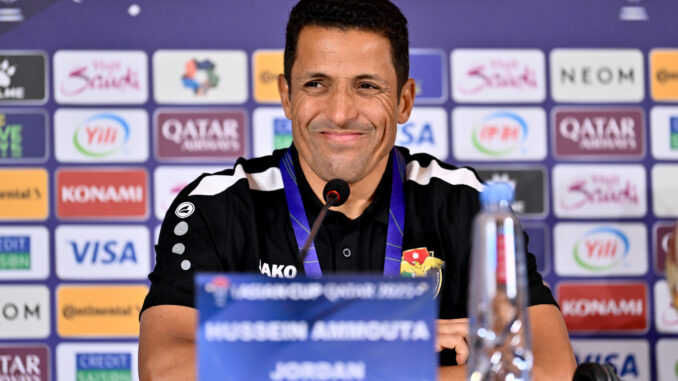
The year is 2000. A young Qatari journalist named Khalid Jassem, in his 20s, is interviewing a group of footballers seated in front of him. They’ve just won the Qatari league title for Al-Sadd, one of the country’s most storied clubs, after a gap of 11 years.
The man at the centre of the attention is Hussein Ammouta, a Moroccan midfielder and arguably the leading star of the team. He is dressed in Qatari garb from head-to-toe; the thobe-ghutrah-egal combination fits him well. Responding to Khalid’s questions, Ammouta goes on to give credit to the club’s management, led by the president Sheikh Tamim bin Hamad.
Fast forward 24 years, and all three people mentioned in that paragraph have had significant changes happen in their life.
Khalid Jassem is now one of the most recognised sports presenters in the Middle East, with over a million followers on Twitter/X, after his talk show Al-Majlis became a popular and somewhat controversial staple in the football culture of the region.
Sheikh Tamim later became Heir Apparent of the country, and then got catapulted into the global spotlight when his father abdicated in his favour, making him the youngest Amir in the country’s history.
Our focus, however, is on Hussein Ammouta. His life changed too, in ways he might not have expected. Or did he?
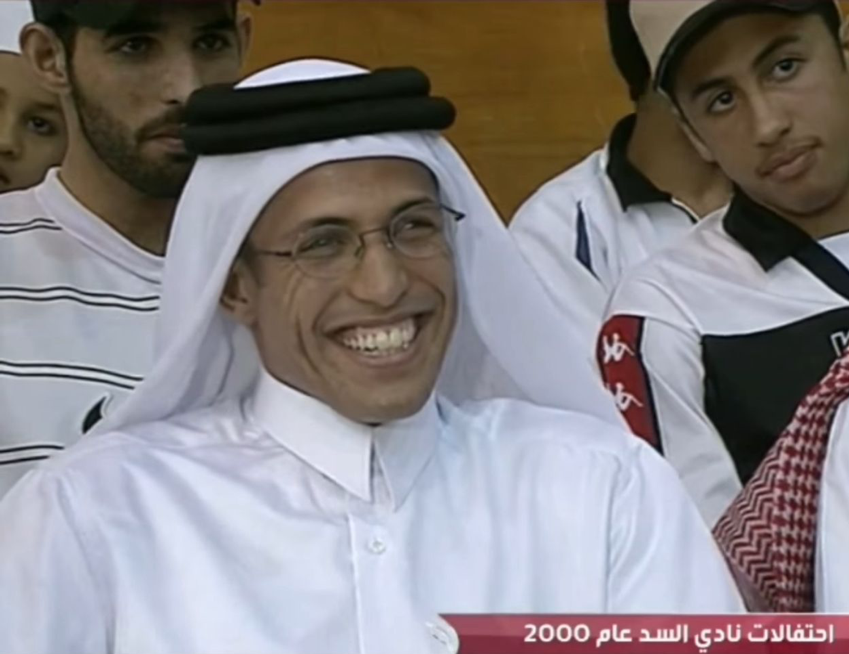
That footage from 2000 appeared on Al-Majlis, in the run-up to the AFC Asian Cup 2023 final between Qatar and Jordan. The context? Ammouta had just led Jordan on a fairytale run to the title decider, beating the likes of Iraq and South Korea on the way, only just over six months after taking charge as coach of Al-Nashama.
As fate would have it, his team would now face Qatar, in Qatar, a place where he had spent a significant part of his life, which shaped it and left unforgettable memories.
Ammouta’s story begins in the northern Moroccan city of Khemisset, where he was born and grew up playing in its dusty pitches. After coming through at his hometown club Ittihad Khemisset, the youngster made a name for himself at the much bigger Fath Union Sport in the capital city Rabat. And then, at the age of 27, he took the plunge and went abroad.
A season in Al-Riyadh in Saudi Arabia was followed by a move across the border to Qatar. It would turn out to be pivotal step in his footballing life.
Towards the end of the 1996-97 season, Ammouta arrived at Al-Sadd, a club who had a history of success in Qatar but then somehow had failed to win a major title for three years. In his second game, an Amir Cup fixture against Qatar SC, the Moroccan made a splash, scoring a late double that helped secure a 3-3 draw and a 4-3 aggregate victory. That season would also end without a trophy for the Wolves, but Ammouta’s arrival had sparked something.
Starting from 1997-98, Ammouta led a revival in Al-Sadd’s fortunes, with the team going on to win the Sheikh Jassim Cup and the Heir Apparent Cup. The latter triumph became immortalised in Al-Sadd folklore; not only did the club win the trophy for the first time in their history but it came after a sensational 3-2 comeback victory over fierce rivals Al-Arabi.
Playing in front of a capacity crowd at the Khalifa International Stadium, Al-Arabi had taken a 2-0 lead into half-time, but Al-Sadd emerged after the break a different side with the hunger to win.
With a second half performance that has few equivalents in Qatari football history, Al-Sadd bounced back to claim victory and it was Ammouta who played a crucial role. He set up the legendary Sergio Ricardo twice, first with a low cross towards the near post to make it 2-1. Then, after Abdulnasser Al-Obaidly equalised from a free-kick, Ammouta fed Sergio with a pinpoint aerial delivery for an 86th minute header that proved to be a memorable winning goal.
In the league, however, Al-Sadd could only finish third, but Ammouta supplied 10 goals from midfield, making him the competition’s joint top scorer alongside Alboury Lah and Claudinho. Al-Sadd hadn’t had a league top scorer for ten years.
More titles would come in the next three years. A Sheikh Jassim Cup triumph in 1999 was followed by a league and Amir Cup double in 2000. The league victory was particularly special, breaking an 11-year drought, and leading to the celebrations referenced in the opening paragraph of this piece. Ammouta was at the heart of it all, one of the players who defined that memorable era for Al-Sadd fans.
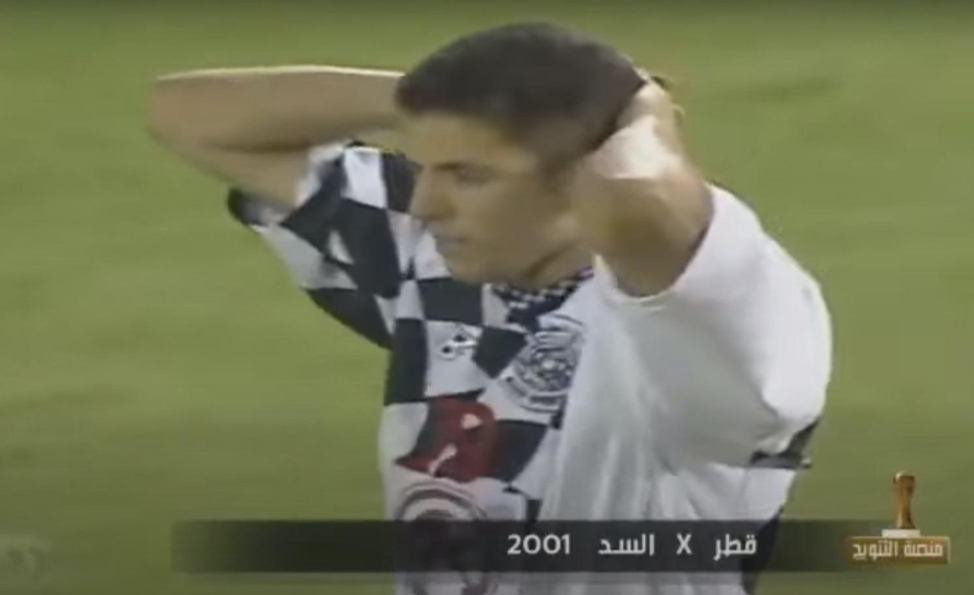
Finally, in 2001, Al-Sadd lifted a second straight Amir Cup title. That match against Qatar SC ended goalless and went to a penalty shootout that saw more misses than goals. Ammouta was one of those who missed, sending his shot wide but he was relieved at the end as Al-Sadd emerged victorious.
That would be Ammouta’s final game at Al-Sadd. In an ironic twist, after a short stint at Sharjah in the UAE, he moved to Qatar SC in the 2001-02 season. His frist game? Against Al-Sadd, of course. Ammouta put emotions aside and went on to score the third goal in a massive 5-0 victory for QSC.
It was like a shift in fortunes for the iconic black-and-yellow club. In his lone season at the club, Ammouta helped QSC win the 2002 Heir Apparent Cup, with a 2-0 victory in the final against Al-Ittihad (now Al-Gharafa). He scored the opening goal, after being set up by Jassim Al-Buenain, the current president of the Qatar Football Association. That triumph broke a 25-year title drought for QSC, and is remembered to this day by their fans.
Ammouta’s time as a player in Qatar came to an end that season, ironically once again, with a defeat to Al-Sadd in the Amir Cup final.
But if the playing career was over, Ammouta was not done with football.
Dipping his toes into management, having started out as a player-coach at Moroccan side Zemmouris, he then mirrored his playing days with stints at Ittihad Khemisset and FUS Rabat. At FUS, he led the team to promotion from the second division before winning the Throne Cup, and the CAF Confederation Cup as well.
The parallels with his playing career continued in 2011 when he joined Al-Sadd, the scene of several memorable Ammouta highlights, as technical director.
In that role, he served alongside head coach Jorge Fossati, and it would prove to be a winning combination as Al-Sadd went on to lift the AFC Champions League title, and then finish third at the Club World Cup.
In one of the most enduring images from that Champions League final, we saw Fossati, his assistant Leonardo Martins, Ammouta and the club’s long-serving Bangladeshi support staff member Yaris, all locked in a tight emotional hug, after Nadir Belhadj dispatched the winning penalty.
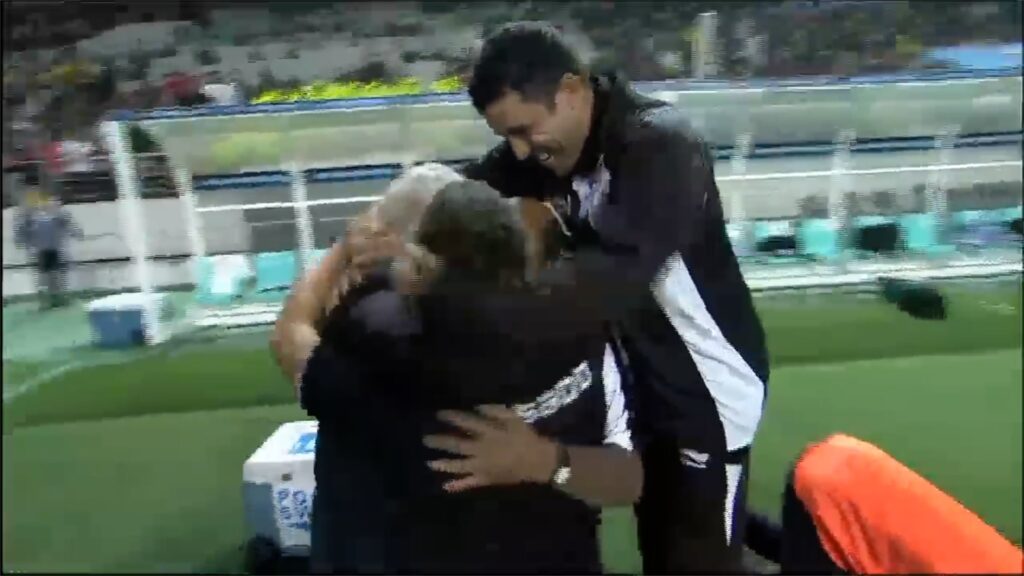
In 2012, Fossati departed the club, and such was Ammouta’s standing that it felt only natural for Al-Sadd to appoint him as the successor.
In the three years that followed, Ammouta helped transform the team, instilling a winning mentality and a strong sense of belief, while earning a reputation for being a disciplinarian.
After inheriting a side that had not won anything domestically for four years, playing under the shadow of Al-Duhail and Al-Gharafa, Ammouta led the the Wolves to their first league title in six years, with Raul Gonzalez as captain, in 2013. Back-to-back Amir Cup titles followed, in 2014 and 2015.
It wasn’t just about the trophies. That era will forever be known for the emergence of several talents: Saad Al-Sheeb, Ali Asad, Abdulkarim Hassan, Almahdi Ali, Musaab Khidir, to name a few, with Hassan Al-Haydos really stepping up to be a key player as well. And who can forget Khalfan Ibrahim?
Ammouta also had the opportunity to implement his tactics with several distinguished foreign players, with Raul, Younis Mahmoud, Mamadou Niang leading the line, while he also coached current Barcelona boss Xavi Hernandez for a brief period in the 2015-16 season.
A few weeks after Xavi’s arrival, Ammouta bid farewell to Al-Sadd. The reasons for his departure are not clear, but Ammouta left behind the core of a winning combination, something that Xavi fit into, beginning a new era for the club.
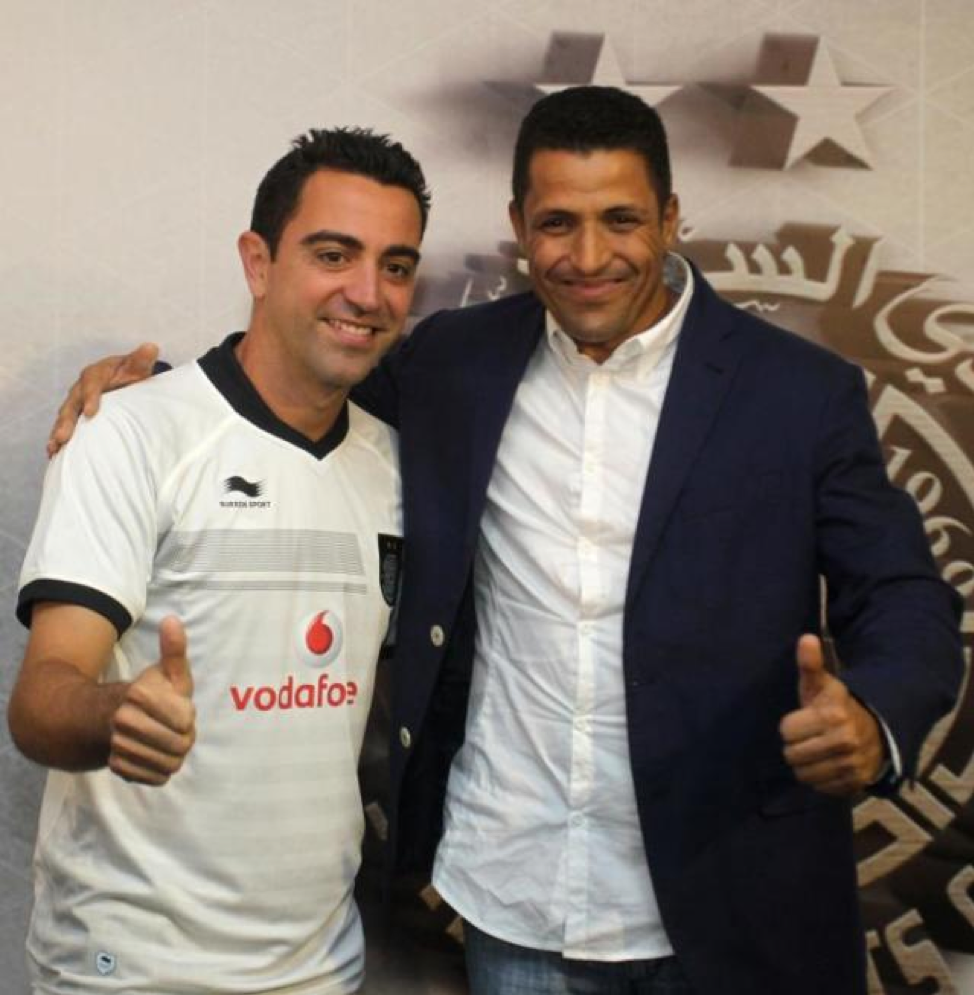
The Barcelona legend would be the icon of that period, establishing himself in the history of Al-Sadd, like Ammouta did, as both player and coach.
Ammouta’s managerial career has been on an upward curve since then, starting off with a sensational Moroccan league and CAF Champions League double at Wydad in 2017, and then with 2021 African Nations Championship with Morocco’s A team, before leading Al Jaysh Al Malaki (AS FAR Rabat), to their first Moroccan league title in 15 years.
Finally, in June 2023, he took over as coach of the Jordan national team. What followed is now being talked about in awe all across Jordan and the wider region.
Ammouta led Jordan in nine games in the run-up to the Asian Cup, and at the start of the tournament, his record read six defeats, two draws and one win. Criticism rained down on the 54-year-old but he was unperturbed.
The lone win, incidentally, had come against Qatar. It is only fitting that Ammouta has turned his side’s fortunes around in such style, to set up another fixture against Qatar, and this time, in the final of the Asian Cup.
After the semifinal victory over Korea Republic, Ammouta was handed a phone in the middle of a live TV interview. On the other side of the call was Khalid Jassem, the same man who had interviewed him 24 years ago.
Khalid led the members of Al-Majlis in an impromptu rendition of “Hussein, Hussein”, while Ammouta just stood there and grinned.
On that same night, beIN Sports presenter Mohammed Saadon Al-Kuwari, a long-suffering Qatar SC fan, embraced Ammouta on the pitch and gave him a kiss on the head, and the two spoke about QSC’s 2002 Heir Apparent Cup win.
Those two moments that displayed the high esteem with which the Moroccan is held among the Qatari football community.
The Jordanian fans are now singing “We Love You Ammouta!” in Souq Waqif, in the heart of the city where the Moroccan maestro earned a name for himself, as both player and coach.
Regardless of what happens in Lusail Stadium on Saturday night, Ammouta has already won. That’s not to say he is short on motivation against title holders Qatar, a side featuring many faces he knows well.
His hunger to win is always there and he now stands on the brink of the biggest achievement in Asian football.
You can expect nothing less than the very best from him, and his fearless team.
Lead Photo: Asian Football Confederation
Listen to The Asian Game Podcast as we talk to Jordanian journalist Mahmoud Al-Fadli about their fairytale run to the final




